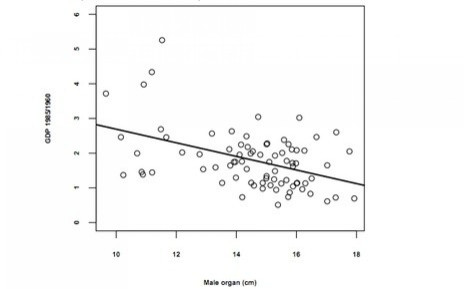What Penis Size Reveals About Economic Growth

When it comes to economics, some countries are endowed differently than others.
Penis size, not economic policy or natural resources, is the key factor separating thriving economies from stagnant ones, according to a study published by the University of Helsinki's Tatu Westling.
Researchers had already mapped out average lengths for various countries -- as seen in this handy graphic -- but Westling crunched the data to try and establish a correlation to GDP growth between 1960 and 1985. The result was Male Organ and Economic Growth: Does Size Matter? Westling found that the countries with the smallest average penis size boasted the greatest rates of growth, while overall GDP was greatest in countries with average sized penises. GDP plummeted at extremes of the spectrum.
Other studies focused on economic, social and political factors, these and many related treatments largely abstain from biological and/or sexual considerations. He added that anatomical dimensions, rather then political systems, seemed to the strongest and most reliable determinant of economic vitality.
With due reservations it is also found to be more important determinant of GDP growth than country's political regime type, the paper's abstract said.
In an interview with Global Post, Westling admitted that he embarked on the project as a half-serious attempt but was surprised at how robust the data was, although he added that the findings do not that I believe in causality at this point.
Reactions have been both amused and serious, Westling wrote in an email. The latter means that some have speculated whether there is actually some causality or are the links completely spurious. It might evidently be either way.
© Copyright IBTimes 2025. All rights reserved.





















